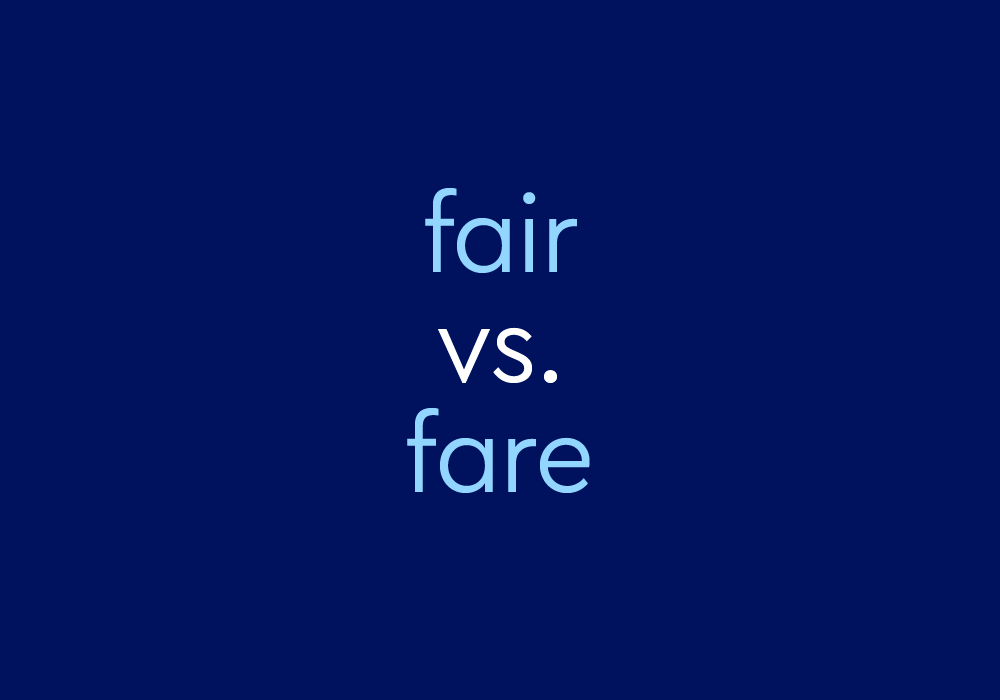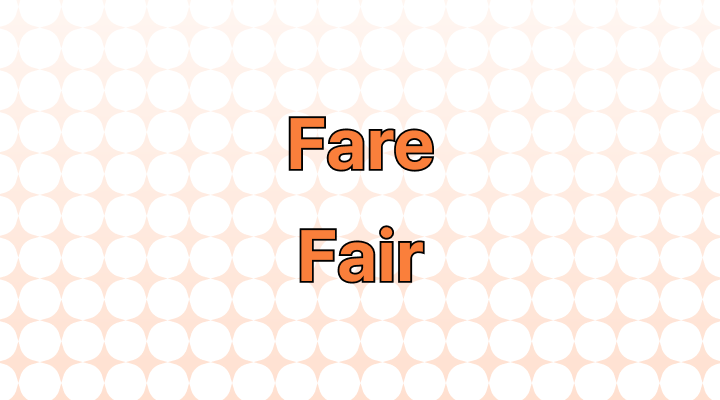"Fare" denotes the price you pay for a ticket or the food you enjoy at the event while "fair" refers to an event with rides and games. "Fair" also means just, equitable, or free from bias or favoritism, pleasing in appearance and good weather conditions.
What does fare mean?
- Verb: "Fare" means to perform or manage in a particular way, especially in terms of how someone or something is doing or coping in a given situation. It can also describe the progress or outcome of an endeavor.
- Cost of Transportation: "Fare" typically refers to the price or cost of a journey, especially when using public transportation like buses, trains, subways, or taxis.
- "The subway fare has increased this year."
- Food or Cuisine: Less commonly, "fare" can also refer to food, especially when discussing a specific type of food or a meal.
- "The restaurant's fare includes a variety of international dishes."
More example sentences
- The taxi driver quoted a reasonable fare for the trip to the airport.
- How did your favorite team fare in the championship game last night?
- When traveling by subway, it's important to have the correct fare ready for the turnstile.
- The restaurant's new chef introduced a gourmet fare that quickly became popular with diners.
- Despite facing tough competition, the small local bakery's pastries continue to fare well in taste tests.
- In the storm, the ship struggled to fare safely through the turbulent waters.
- The fare for the concert tickets was a bit high, but it was worth it for the incredible performance.
- As a food critic, he often dined at various restaurants to assess the quality of their fare.
- The airline offered a special discount fare for passengers traveling during the off-peak season.
- With the changing weather patterns, farmers were uncertain about how their crops would fare this year.
- How did she fare in the competition?
- The team fared well in the tournament, reaching the finals.
- Despite the challenging circumstances, they fared better than expected.
- He fared poorly in his exams due to a lack of preparation.
- The restaurant is faring badly in the current economic downturn.
- How did your friend fare after the surgery?
Common idioms/phrases
- "How does it fare?": This phrase is a more formal way of asking about someone's well-being or progress.
- "I haven't seen you in a while. How does it fare with your new job?"
- "Fare thee well": An old-fashioned expression used to bid someone farewell in a fond and often poetic manner.
- "As you embark on this new journey, I wish you to fare thee well."
What does fair mean?
- Equitable or Just: One of the most common uses of "fair" is to describe something that is just, equitable, or unbiased. It implies that a situation or decision is reasonable and not influenced by favoritism.
- "The judge's ruling was fair to both parties."
- Pleasing in Appearance: "Fair" can also describe something that is beautiful, pleasing to the eye, or attractive.
- "She had fair features and a radiant smile."
- Weather Condition: When referring to weather, "fair" indicates clear or pleasant weather conditions without significant precipitation or storms.
- "It looks like we'll have fair weather for our picnic tomorrow."
- Exhibition or Event: "Fair" can be used to describe an event or exhibition where goods are bought and sold, such as a trade fair, craft fair, or job fair.
- "The local fair showcased handmade crafts and delicious food."
More example sentences
- The judge ensured a fair trial for the defendant, upholding the principles of justice.
- The amusement park was a great place for families to enjoy a day of fun and fair rides.
- After the heavy rain, the weather cleared up, and it turned into a fair day for the outdoor event.
- Sarah's fair complexion made her particularly sensitive to the sun's rays, so she always wore sunscreen.
- The teacher graded the students' assignments fairly, giving everyone an equal chance to excel.
- The antique fair featured a wide array of collectibles, from vintage books to rare coins.
- It's essential for employers to offer fair wages to their employees to maintain a motivated workforce.
- The negotiation resulted in a fair compromise that satisfied both parties involved.
- The community decided to hold a fair to raise funds for the local school's renovation project.
- Environmentalists advocate for fair treatment of the planet, emphasizing sustainability and conservation.
Common idioms/phrases
- "All's fair in love and war": This idiom suggests that in certain situations, like matters of the heart or during conflicts, almost any action is considered acceptable, even if it's not entirely fair.
- "She did whatever it took to win his affection, believing that all's fair in love and war."
- "Fair and square": This phrase means to do something honestly and without cheating.
- "We won the game fair and square; there was no foul play involved."
- "Fair game": When something or someone is considered "fair game," it means they are open to criticism, scrutiny, or competition.
- "In politics, your past actions are fair game for the media to investigate."
- "It's a fair cop": This is a British idiom used when someone admits they are guilty of something, often in a humorous or light-hearted way.
- "You caught me red-handed; it's a fair cop."
- "Fair-weather friend": This idiom describes a person who is supportive and friendly only in good times but abandons you during difficult times.
- "He's just a fair-weather friend; he's never there when I really need help."
Discover more about the AI English proofreader, Engram!
Free ChatGPT-Powered Grammar Checker | Engram
Use Engram’s free grammar checker, powered by ChatGPT, to fix your grammar, spelling, punctuation, and word usage errors

Reference
“Fair” vs. “Fare”: What’s The Difference?
Time to play fair and learn about the different meanings and uses of “fair” and “fare.” Read through our explanation on how to tell the difference.














